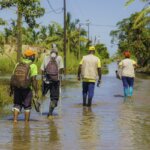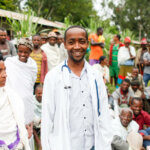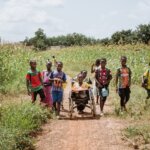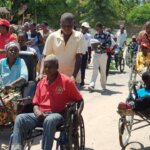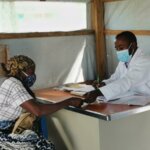- Disability Rights
- Humanitarian Action
People with disabilities tell us how they’ve stayed strong in the face of cyclones, devastating floods and COVID-19.
When Cyclone Eloise hit in January this year, it turned over 366,000 lives upside down. The scene was all too familiar in a region that has seen four violent tropical storms arriving in the space of two years, laying waste to the lives of people in Mozambique. More than 34,000 people are currently displaced.
From Cyclone Idai in March 2019 to Kenneth a month later, to Chalane in 2020, and now Eloise this January, Mozambicans can barely get ahead for all the knockbacks. Add COVID-19 to the mix and their prospects seem even bleaker.
According to Germanwatch’s 2021 Climate Risk Index, Mozambique is the fifth most vulnerable country to climate change worldwide. Until governments take steps to stop global temperatures from soaring, the storms will keep coming.
People with disabilities among the worst affected

People with disabilities in Mozambique are usually the worst affected by these natural disasters and yet the least likely to receive the help they need. After Idai struck, disability NGO Light for the World and UNICEF set out a clear pathway for the humanitarian sector to make sure that aid reaches those who need it most. The guidelines – which came from the people who know the situation best: people with disabilities – are already paying off.
Things have changed significantly since Idai. Currently, humanitarian actors are proactively consulting disability people’s organizations so that people with disabilities are not left behind.
Zacarias Zicai of Light for the World Mozambique

To survive so many disasters, people with disabilities in Mozambique have had to dig deep. The media discourse in developed countries regularly highlights the resilience required to deal with COVID-19 and its consequences. Those with disabilities in Mozambique are operating at a whole other level – one characterised by remarkable strength, courage and persistent positivity. Here, they share their lessons in resilience – advice we can all learn from.
1. You are stronger than you think
In Buzi, a low-lying area which was one of the hardest hit by Idai, Eloise once again left many people, including those with disabilities, queuing in stagnant, disease-ridden water for days waiting to be evacuated, surviving by sharing what little they had between them and sleeping on the ground.

Luis Faquira (53) was badly injured in a mine explosion during the civil war, and has been living in a temporary accommodation centre with his wife, who also has a disability, since his home was destroyed in the Cyclone.

“It was terrible because many houses were destroyed, but at the same time, I could see how powerful community solidarity is in difficult times. I saw many of us fighting to survive, and I saw others helping each other, no matter how poor people were.
Whenever we all come together, there is hope. And if there is hope, we will always have strength to continue fighting. I could try to run away, try to find new places, but I love Buzi and together we will recover again.”
2. Your capacity to adapt will surprise you

Orphaned as a child, Jorge Manuel Jose (18), has been in his uncle’s care for most of his life, and has a physical disability which means he can’t walk unaided. As Eloise swept in, Jorge’s uncle took him to this rusty old Caterpillar truck to keep him safe from the inevitable floods, and he’s now been there a week.
Jorge has adapted to his temporary shelter as best he can. “My uncle took me to this place to save me, because I was almost drowned during the last Cyclone. I can’t run from danger like others. This place has been my bed and my dining room. I’m glad that I will not have problems with the floods now.”
He’s currently a year 11 student, but his school is currently closed due to COVID-19. He misses the company of his fellow students, and the learning environment. Still, he’s making sure he’s ready when the time comes to go back. “As there is no light, I use the sun to read and study, preparing myself for the return after the pandemic.”
Jorge hasn’t been forgotten by relief efforts. He’s received a blanket, mosquito net, soap, face masks and materials to help him and his uncle rebuild their home.
3. Help others to help yourself

Eulália Jose (50) is one of thirty Light for the World field workers who are fighting to make sure that the needs of people with disabilities are catered for. They are particularly vulnerable to the unsanitary conditions, and measures to reduce the spread of COVID-19 have been compromised given the lack of social distancing and protection such as face masks.
“We are trying to ensure that people with disabilities are prioritised and have proper support, and that they’re not forgotten during this crisis. Inclusion always matters.”
Eulália Jose (50)
Eulália’s job has been a bit easier this time around, with at least two hundred humanitarian aid staff trained by Light for the World to include people with disabilities in emergency aid delivery.
4. Ask for help when you need it

Years ago, complications while giving birth left Helena Joaquim (27) unable to walk. She experienced discrimination because of her disability and battled depression before Light for the World stepped in with support. Helena was lucky to be one of the first people to be rescued when Cyclone Eloise hit.
When the rescue boat arrived, they hadn’t enough space, so they saved me and my daughter, but my husband was left behind. We spent the first night outside… I just had the clothes that I was wearing. I thought that we would die there.
Helena from Mozambique
Helena and her daughter survived. “One of the few happy moments was when I finally saw my husband again. We were together after being separated for several days. The field workers got me a tent and some bottles of clean water for drinking. Now with their help I can access the food being distributed and some other basic things.”
5. It’s never too late to start again

Laurinda Manuel Nhama (54) has had to re-start her life not once, but several times. She’s had her share of setbacks, including a crocodile attack that claimed her right leg.
If there’s one good thing she can say about the latest cyclone – Eloise – it’s that emergency support has improved. “For the first time in many years, they prioritised people with disabilities and took into account our assistive devices. After arriving at the accommodation centre, they not only counted how many people were there, but they also searched for us people with disabilities, and asked if we needed specific support.”
Ever the optimist, Laurinda sees hope in the coming years. “We have each other and we believe that better days will come. I am the mirror for my grandchildren, I need to be strong for them and inspire them to never give up no matter what happens. I am not the same person I was before losing my leg. People can’t even imagine what I had to do to survive. The scar I carry and the disability I have are proof that I fought for my life.
“I am very positive about the future, but we’ve learnt that it’s not safe to be by the river and we need to search for a higher place to live. Now, it’s time to re-build and re-start life. We will always begin again whenever it’s needed.”
